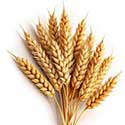Less known facts about harvests in bygone times

This page explains why bringing in the harvest in the past took place later in the year than it does today which made for intensive work and stress for everyone involved, followed by relief and celebration once it was safely completed. The page also clarifies some common misunderstandings between the terms 'corn' and 'wheat'.
____
By the webmaster based on discussions with people involved with old harvesting practices
Was harvest more difficult in the past?
In the past, successful harvests were desperately important. A bad harvest meant little or no grain for the following year. That meant a shortage of bread which came from flour which in turn came from wheat which was invariably home-grown. So bringing in a successful harvest was stressful as well as hard work.
Although the hardest and most stressful time was at gathering in the harvest, work needed to done at a several stages throughout the previous year: preparing the soil (ploughing) sowing the seed, cutting and collecting the ripe wheat (reaping) and making flour from the ears of wheat (threshing).
Much of this was harder and more intense work than it is today, as explained on the linked pages. In particular, though, the crop ripened much later than it does today which made it much more vulnerable to bad weather. Why? Read on. First though, clarification of a couple of words associated with harvests.
Corn or wheat?
When I was growing up in England in the 1940s, whenever anyone talked about corn, it was always assumed that they meant wheat because that was by far the main crop. So a cornfield meant a field of wheat. (Oats and barley were also grown but to a much lesser extent.)
Incidentally after World War Two, with the British shortage of wheat, I remember a consignment of corn being requested from the Americans or Canadians - but they regarded corn as maize. So maize was what we got. I was too young to remember what was done with all that maize. I am sure wasn't wasted, but we learnt to be more particular in our language. With hindsight it was an amusing incident, but not at the time.
Whatever, the point to be born in mind when reading this set of pages is that in the early to mid-20th Century and before, the terms 'corn' and 'wheat' were used interchangeably to mean wheat. I shall continue doing so on these pages, to give the feel of the time.
The worst hindrance to a good harvest - no hybrid corn
Of all the problems that beset farmers growing corn, by far the worst was the lack of today's hybrid seed - not of course that anyone realised this at the time. Hard, intense work could be managed, but vulnerability to weather could not and the current type of corn was certainly extremely vulnerable to bad weather.
The corn of my childhood in the 1940s and 50s was much taller than it is today. I remember, as a young child, getting lost in a cornfield in late summer because it was taller than me and I couldn't see my way out.
The taller corn meant a longer growing season. This in turn meant a later harvest - and seriously more reliance on the weather. A wet summer and early autumn could ruin the crop. Wind and rain would blow it down onto the ground, making it rot quickly and be impossible to cut. It was a lucky break if a harvest could take place in September. Normally it was sometime in October.
So during harvest time, everyone in any way associated with the farm worked from dawn to dusk, taking every possible advantage of good weather. Even school children in country areas were allowed off school.
Cornfield pests
contributed by V. John Batten
Rabbits were a curse to practically all farmers, eating off young corn plants around the headlands of fields, often for 20 yards or more into some fields. In turn of course, they did help the nation with an important off-ration meat supply.
Incidentally I was always told that farmers never minded our trampling into the corn early in the year when it was just sprouting because it split the shoots and so produced a higher yield. I am not at all sure how true this was.
Harvest suppers and harvest festivals
After a successful harvest, there was great rejoicing and relief. So there were celebrations for the farmhands and their families - and a good many other people as well. These were known as 'harvest supper'. There were also special thanksgiving church services known as harvest festivals.
Here is the first verse of hymn traditionally sung at a harvest festival which captures the mood well. 'Ere' was an old word meaning 'before'.
THE HARVEST HYMN
Come, ye thankful people, come
Raise the song of harvest home
All is safely gathered in
Ere the winter storms begin.
God our Maker doth provide
For our wants to be supplied
Come to God's own temple, come,
Raise the song of harvest home.
Why bringing in the harvest is no longer widely celebrated
Harvest festivals are no longer widely celebrated. This is largely because, with the development of the shorter hybrid corn, ripening is earlier and no longer so dependent on the weather. There is more mechanisation, no longer does everything stop to bring in the harvest and there is the general assumption that the harvest will inevitably be brought in safely. If not, there are always imports.
| sources | webmaster | contact |
Text and images are copyright
If you can add anything to this page or provide a photo, please contact me.



